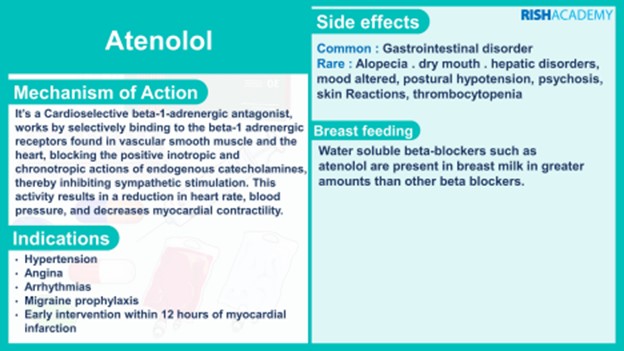A nurse caring for a client who has a new prescription for atenolol. For which of the following adverse effects should the nurse monitor the clients
Hypokalemia
Bradycardia
Anemia
Neutropenia
The Correct Answer is B
Atenolol is a beta-blocker medication commonly used to treat conditions such as hypertension (high blood pressure) and certain heart rhythm disorders. One of the intended effects of atenolol is to lower the heart rate by blocking the action of adrenaline on beta receptors in the heart. However, this can sometimes result in bradycardia, which refers to a heart rate that is slower than the normal range.

Hypokalemia, or low potassium levels, is not directly caused by atenolol but can be an indirect effect. Beta-blockers like atenolol can potentially interfere with the normal release of insulin and contribute to increased urinary excretion of potassium. Therefore, it's important to monitor potassium levels in clients taking atenolol, as low potassium levels can have adverse effects on various body systems.
Anemia and neutropenia are not typically associated with the use of atenolol. Anemia refers to a decrease in the number of red blood cells or a decrease in the amount of hemoglobin, which carries oxygen to the body tissues. Neutropenia refers to a decrease in the number of neutrophils, which are a type of white blood cell involved in fighting infection.
Nursing Test Bank
Naxlex Comprehensive Predictor Exams
Related Questions
Correct Answer is ["14"]
Explanation
To calculate the infusion rate in drops per minute (gtt/min), we can use the following formula: Infusion rate (gtt/min) = (Volume to be infused (ml) * Drop factor) / Time (min) Given:
Volume to be infused: 1000 ml
Drop factor: 10 gtt/ml
Time: 12 hr
First, we need to convert the time from hours to minutes:
12 hr * 60 min/hr = 720 min
Now, we can calculate the infusion rate:
Infusion rate (gtt/min) = (1000 ml * 10 gtt/ml) / 720 min
Simplifying the equation:
Infusion rate (gtt/min) = 10000 gtt / 720 min
Dividing both sides:
Infusion rate (gtt/min) ≈ 13.89 gtt/min
Rounding the answer to the nearest whole number, the nurse should set the manual IV infusion to deliver approximately 14 gtt/min.
Correct Answer is C
Explanation
Hydrochlorothiazide is a thiazide diuretic commonly used to treat hypertension and edema. One of the potential side effects of hydrochlorothiazide is hypokalemia (low potassium levels). To help counteract this effect, it is important for the client to increase their daily intake of foods high in potassium, such as bananas, oranges, spinach, avocados, and potatoes. This helps maintain adequate potassium levels in the body.
The other options mentioned are incorrect:
Take the medication on an empty stomach: Hydrochlorothiazide can be taken with or without food. It does not need to be taken on an empty stomach.
Muscle weakness is an expected adverse effect: Muscle weakness is not a common or expected adverse effect of hydrochlorothiazide. If the client experiences muscle weakness, they should notify their healthcare provider.
Take the medication at bedtime: Hydrochlorothiazide can be taken at any time of the day. There is no specific requirement to take it at bedtime. The dosing schedule should be determined based on the individual's needs and healthcare provider's instructions.
Whether you are a student looking to ace your exams or a practicing nurse seeking to enhance your expertise , our nursing education contents will empower you with the confidence and competence to make a difference in the lives of patients and become a respected leader in the healthcare field.
Visit Naxlex, invest in your future and unlock endless possibilities with our unparalleled nursing education contents today
Report Wrong Answer on the Current Question
Do you disagree with the answer? If yes, what is your expected answer? Explain.
Kindly be descriptive with the issue you are facing.
